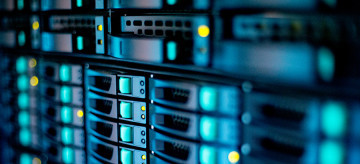- Advertising
- Bare Metal
- Bare Metal Cloud
- Benchmarks
- Big Data Benchmarks
- Big Data Experts Interviews
- Big Data Technologies
- Big Data Use Cases
- Big Data Week
- Cloud
- Data Lake as a Service
- Databases
- Dedicated Servers
- Disaster Recovery
- Features
- Fun
- GoTech World
- Hadoop
- Healthcare
- Industry Standards
- Insurance
- Linux
- News
- NoSQL
- Online Retail
- People of Bigstep
- Performance for Big Data Apps
- Press
- Press Corner
- Security
- Tech Trends
- Tutorial
- What is Big Data
5 Emerging Technologies That Every Marketer Should Understand
Who says marketers can't or shouldn't be tech-savvy? In today's day and age, a marketer needs to be up to date with the plethora of technological advancements. 5G, IoT, edge computing, hyper-automation, and extended reality are just a few of the innovations that will impact marketing - one way or another. Find out how and don't get left behind in the marketing game.

5G
The highly expected 5G wireless technology will see a record speed of 20 Gbps, up 2000% from the fourth generation of broadband cellular network technology, which will impact all sectors of business. But how will marketing be affected?
First, adapting marketing campaigns to accommodate specific groups in specific locations, known as personalization, has already been a critical topic in marketing. But what 5G will bring to the table will be hyper-localization. The number of internet users increases along with access to faster internet in more remote locations, and the consequences of the coronavirus pandemic and the lockdown are currently accelerating this process even more.
The more locations connected to the internet, the more marketing personalization must keep up and deliver a better and unique experience to consumers. Although targeting and localization will improve and provide unique opportunities, the platforms, and the whole marketing workflow will have to be adapted to these changes and challenges. The amount of data collected will allow for more meaningful and helpful targeting - instead of the one-size-fits-all message - which will make consumers more receptive to the products and services marketed.
Secondly, according to Hubspot, 68% of people already favor finding out about new products through short videos. Businesses will start using more video ads in their marketing efforts, especially with the advancement of 5G. The increased speed of the network, spectral efficiency, delivery throughput, and low latency will enable consumers to download even HD videos smoothly and watch them lag-free. In this century of speed, video marketing is more appealing and easier to grasp for customers since a 30-second video can express and illustrate more than an article can, and faster; this will give brands a certain amount of freedom of expression. It’s estimated that by 2022 online videos will amount to over 82% of all consumer internet traffic.
Lastly, data analysis is already partly done in real-time, but 5G will allow for increasingly more activities to be analyzed instantly, which will improve targeting, segmentation, customer experience, customer journey, and ultimately, decision-making. However, data analytics doesn't only rely on speed, but also on performance – increased by edge computing, and on location – increased by the interconnectivity of IoT devices.
Edge Computing
Edge computing will bring computation and data storage closer to the location where it is needed, which will also help marketing in analyzing data in real-time. Edge computing technology, along with IoT data, will improve response times and eliminate delays. When it comes to marketing, these will permit instant readjustments to the overall workflow.
Internet of Things
Besides helping companies create better products by listening to customer needs through the collected data, IoT will also bring massive changes in marketing, allowing the delivery of the best marketing message on the right devices at the right time. Industry professionals declare that "the opportunity for marketers is the rich and robust set of data these devices will produce." Through data-driven marketing, analyzing consumer habits will be possible across numerous web-connected devices and platforms, providing valuable insights into the buyer's journey.
According to Salesforce's report on the state of marketing, the average business currently uses about 15 data sources for marketing, with an expected increase to 45 data sources in 2025. Data-driven marketing will offer companies that take this approach the opportunity to reach higher levels of customer engagement and personalization. However, it will also require adopting AI and ML algorithms in their path to unravel data.
Hyper-Automation
Defined by Gartner as "the application of advanced technologies, including artificial intelligence and machine learning, to increasingly automate processes and augment humans," hyper-automation was also named the number 1 strategic technology trend for 2020 in their Top 10 Strategic Technology Trends for 2020 report. One of the main parts of hyper-automation is RPA or Robotic Process Automation. In recent years, RPA has gained momentum across enterprises in the back-office operations, such as in finance, legal, and HR, but is now expected to create a buzz in marketing and sales as well.
RPA could help the marketing industry by automating a lot of the repetitive tasks and processes that involve switching between multiple platforms and systems. Not only that, but it could also help in customer engagement by using data to improve targeting. Lastly, using machine learning algorithms in the marketing funnel and on the customer experience, and providing learning-based instead of rule-based decisions in the workflow will bring significant benefits.
Extended Reality
If the impact of the previous four technologies on marketing is not that easily inferred, it's pretty clear how VR, AR, and XR will provide massive changes in marketing. Extended reality will bring products and services closer to the consumers – some might even say too close.
MAC Cosmetics and L'Oreal have already implemented augmented reality for customers to check how their make-up or hairstyle will look before making any real-life changes. Similarly, Ikea developed an augmented reality app that allows you to virtually place furniture in your own house to see how it will look. These approaches make marketing and advertising not only more immersive and engaging but also necessary due to the new reality that COVID-19 instated. The limit will mostly be up to the marketers' creativity.
Looking Forward
Overall, the competition between brands will become fiercer, both in terms of creativity and tech adoption. All these new technologies will bring significant changes to marketing. The next few years will probably see a trial and error kind of workflow: testing new activities and campaigns with new tech and seeing which works best.
Brands and companies will need to store and efficiently sort and analyze the vast amount of raw unstructured data that they collect. Without great storage capabilities, flexibility, and the help of artificial intelligence and machine learning, that will be near impossible.
Marketing's role within companies will also most likely change, collaborating more closely (although probably remotely) with the IT departments and taking over the customer experience: from high-quality content creation and data collection, to leveraging respective data, communicating with customers, and even offering support when needed. It's an excellent opportunity for marketers to grow and be some of the first to innovate and find new ways to leverage new technologies.
About the author
Keen on marketing, future tech, and gaming, Andreea Jakab currently serves as Digital Marketer at Bigstep.
Readers also enjoyed:

Cloud Computing Vs. Edge Computing: Friends Or Foes?


Leave a Reply
Your email address will not be published.